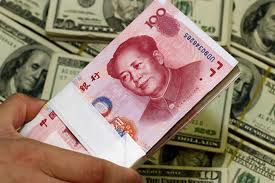by Dr. Miklos K. Radvanyi 
Contrary to the erroneous opinions of most politicians and Sinologists, the People’s Republic of China, well into the seventh decade of its existence, is facing severe political and economic crises. Maoism, the gibberish amalgam of twisted socialist ideas and hard-core Han racism, had never been about Marxism-Leninism with “Chinese characteristics.” Rather, Maoism was designed to be a double edged political sword. On the one hand, Maoism meant autocratic contempt for the “politically incompetent” and “economically immature” subjects who could not be trusted with affairs of any importance. On the other hand, Mao wanted to establish, maintain and protect his “thorough revolution” by excluding intellectuals with “bourgeois mentality”, whether inside or outside the party, and base his autocracy on inexperienced and uneducated workers, peasants and soldiers, self-evidently comprising of incompetent and immature individuals.
Thus, from its inception in 1949, Mao’s People’s Republic was shut within a vicious circle. Mao had no intention to ever entrust the government in the hands of the people. The result was predictable. Until his death in 1976, the people were kept in a state of complete political and economic idiocy; and Mao’s autocracy ended up as a permanent lie.
Thirty nine years of economic growth and relative stability after his death, the Communist Party of China again faces strong political and economic headwinds. To counter these new and complex challenges to his fledgling governance President Xi Jinping coined his own political theory of the “Four Comprehensives” and his deceptively ambiguous economic slogan of the “New Normal.”
First enunciated by Prime Minister Li Keqiang at the opening of the annual session of the National People’s Congress, China’s rubber-stamp parliament, he prognosticated “approximately 7 percent” growth for 2015 and warned that “downward pressures” resulting from unspecified economic difficulties “may be even more formidable” than in the previous years. Not to be outdone, Zhang Gaoli, his deputy and also a member of the Politburo, opined that the “old growth model of featuring high input, high energy consumption and over-dependence on external demand is no longer sustainable”, yet the party and the people “are fully confident about our future.”
Should the rest of the world be really as confident? There are two large political and two equally big economic reasons why the answer should be an unambiguous “no”. The first political reason why the answer should be no is past experiences in the Soviet Union and its former satellite states in Central and Eastern Europe. In the late 1970s and early 1980s the mythical moral and material superiority of communism lost its status as the main source of political legitimacy. In the People’s Republic of China the discredited Maoism was replaced by Deng Xiaoping with the politics of permanent economic growth. In both cases, the political vacuum created by a brazen lie that defined dictatorship as democracy and democracy as dictatorship, sowed the seeds of immorality, cynicism and nihilism, resulting only in drawing the vicious circle of political repression even tighter. In Central and Eastern Europe attempts at economic reform without corresponding political liberty failed, because there was no escape from the insoluble contradiction between the prospect of greater economic freedom and the lack thereof in the political arena. This untenable situation was only resolved by a catastrophe, namely, the total collapse of the communist dictatorships. Correspondingly, the current economic slowdown in mainland China is only the beginning of the political catastrophe that might stretch out over several decades, but will surely destroy the ersatz legitimacy of the post-Mao leadership.
The second political reason is even more compelling. The most important of the “Four Comprehensives” is the requirement to “comprehensively build a moderately prosperous society.” The other “comprehensives” are: deepening of economic reform; governing according to the laws; and applying strictness in governing the party, namely, eradicating corruption. Nowhere in these “comprehensives” is the subordination of the Communist Party of China to the rule of law is mentioned. Clearly, Mr. Xi’s political strategy is a return to Mao’s ruthless ideology of imposing his version of autocracy exclusively by coercion. Yet, the failure of Maoism proved that his erratic and enormously violent autocracy provided neither political nor existential security for the people. Similarly, Mr. Xi’s regurgitated autocracy will fail, because it lacks the most basic ingredient of political stability, the protection of the people from his arbitrary and violent despotism.
With respect to the economy, the myth of the social contract between the Communist Party of China and the people, is a dangerous fallacy. Essentially, the well-being of individuals, and ultimately the entire society, does not depend on a superimposed contract that can be violated at the whim of the autocrat, but on the acceptance of the people which is always conditional on fortuitous circumstances. The Communist Party of China and its government have presided over a highly unbalanced economic growth supported by reckless financial policies. The combination of mounting debt and a precipitously slowing economy is extremely hard to manage, and thus could damage the economy even further.
Secondly, to stop China’s economic decline would require less political intervention amidst more professional macroeconomic management. Judging by the government’s response to the latest stock market crisis, the future does not bode well for reforms in the overall economy.
Like the mythical birds of many cultures, Maoism’s vicious circle has reemerged through Mr. Xi’s determination to save his regime from the fate of the Soviet Union. As a result, the People’s Republic of China is again gripped by the fear of the ruling minority from the people and the people’s primordial fear of the future. Neither official revanchism, tinged with a large dose of racism, nor chauvinistic military adventurism will prolong much longer the inevitable collapse of the illegitimate autocracy of the Chinese Communist Party. Meanwhile, the United States and the rest of the world should prepare for the ensuing inevitable chaos and anarchy.